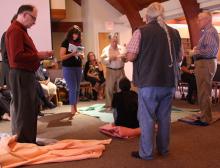Grace Smallboy, an Indian Residential School (IRS) survivor, sat on a small folded blanket in the middle of the Valleyview Mennonite Church sanctuary while around her others—including London area Mennonites—stood on their own blankets representing a variety of Canada’s indigenous people groups.
The “blanket exercise” was part of an event put on by the southwestern Ontario chapter of Kairos, a national ecumenical justice initiative that includes Mennonite Central Committee Canada, on Sept. 28.
Presenter Sarah Burm represented a European settler during the exercise, beginning as a cooperative player but slowly taking control of the land being shared by the natives.
In the debriefing that followed, participants and observers spoke of feeling anger towards the system that had taken the land from the indigenous peoples, of unbelief that it had been so organized and concerted, and of guilt about living in and from the proceeds of the theft.
But Matthew Stevens, an Ojibwe elder and ordained United Church minister, who led the exercise, counselled against guilt, as it can lead to passivity, rather than action.
In his introductory remarks, David Janzen, a member of the local Kairos board, a Christian Peacemaker Teams reservist and a member of Valleyview Mennonite’s Missions Committee, said that the hope was for the event to move folk from knowledge to action.
Enos Kipfer, a member at Valleyview, said that, having acted as if “we know better,” settlers have cut themselves off from so much learning from this country’s indigenous peoples.
The morning concluded with Burm and Smallboy giving a history of the IRS system and recounting children being punished for speaking their indigenous language to their visiting parents, most of whom did not speak English. Many in the group were surprised to learn of the schools, like the Mohawk Institute located in nearby Brantford, which had been tasked with “killing the Indian in the child.”
In the afternoon, participants watched Smallboy’s presentation to the Truth and Reconciliation Commission, in which she spoke of her missing memories of her three years in an IRS institution, memories she is fairly certain she does not want to recover. By learning that both her parents had been in residential schools and from the experiences of others, as well as through both therapy and traditional healing, she has been able to reconnect with her siblings and her son, and to move from suicidal self-harm to working to help others—both indigenous and settler—gain healing.
The day closed with Sue Wilson, vice-chair of the Kairos board, sharing a theological reflection. “[T]he life and mission of Jesus reveal that the kingdom of heaven is shaped by people that have a contemplative heart laced with prophetic and political energies,” she said, noting that contemplatives are sometimes accused of passivity, while activists are accused of unreflective action. Wilson called for participants to take the best of both streams to be builders of God’s kingdom.




Add new comment
Canadian Mennonite invites comments and encourages constructive discussion about our content. Actual full names (first and last) are required. Comments are moderated and may be edited. They will not appear online until approved and will be posted during business hours. Some comments may be reproduced in print.